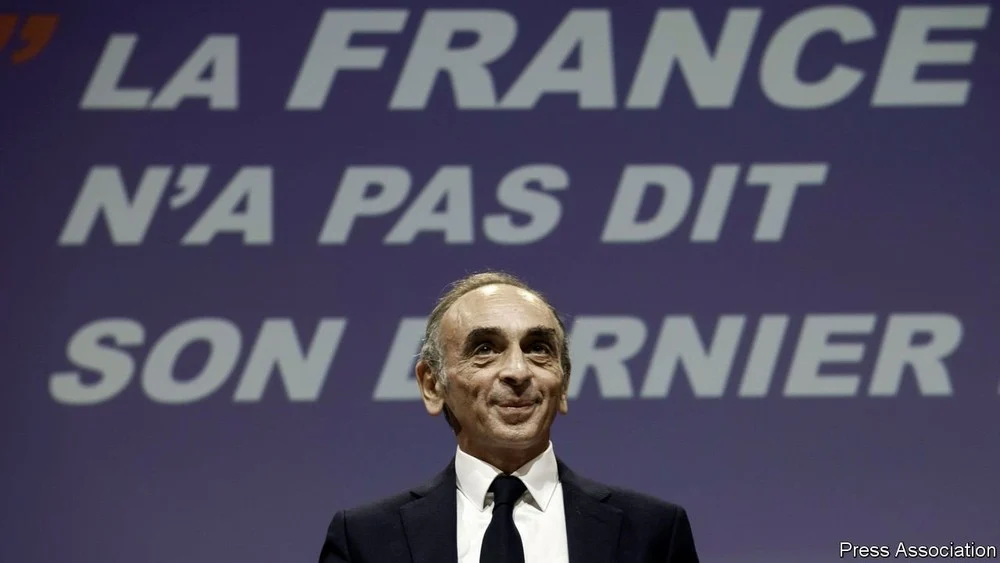“THE FRENCH Trump, it’s you!” a Parisian ally of the former American president once told Eric Zemmour. Or so the outspoken anti-immigrant polemicist claims in his latest bestselling book. A few weeks ago, such an assertion appeared self-serving and fanciful. But a recent poll surge by this Vichy apologist and television personality has taken established French political parties by surprise. Mr Zemmour is seeking nothing less than to upend nationalist party politics and outflank Marine Le Pen, by making the hard-right leader look too soft.

On October 6th, a first-round poll ahead of next April’s presidential election put Mr Zemmour in second place, ahead of Ms Le Pen and behind Emmanuel Macron, the sitting president. This has transformed him from a commentator on frenzied TV talk shows into the subject of them. Which is exactly where the radical nationalist, who has been convicted of inciting racial hatred, wants to be. Polls still give President Emmanuel Macron a first-round lead, and a second-round victory. But they also suggest that Mr Zemmour, who has yet to confirm he is running, could upset presidential ambitions on the left and the right.
The 63-year-old Mr Zemmour has been a controversial pundit for a quarter of a century. His décliniste books predict the collapse of French civilisation, with titles such as “French Melancholy” and “French Suicide”. More recently he has grabbed attention as a provocateur on CNews, a cable channel that some liken to America’s Fox News. “Zemmour président” posters have been pasted to lamp posts and walls. Last month Mr Zemmour was forced to quit his nightly TV show under French rules that require broadcasters to give equal airtime to political figures. The broadcast regulator judged that he was already more politician than journalist, and so his appearances would have to be counted as such.
Whereas Ms Le Pen has tried to sanitise her party’s racist image and distance it from its roots, Mr Zemmour seeks to radicalise, provoke and frame the debate around his own obsessions. He is “counter-feminist”, anti-woke, and blends erudition with outrage, simple sentences and rant. Of Jewish-Algerian descent, he has declared that Vichy France in fact protected French Jews, that foreign first names (such as Mohammed) should be banned, and that Islam is not compatible with France. Jean-Marie Le Pen, founder of the party his daughter now leads, said approvingly that Mr Zemmour says “things that nobody dared say, except me”.
Mr Zemmour’s popularity may yet prove fleeting. But the polemicist, who claims he is a Gaullist, seems to have found a potent pitch. It mixes a veneer of intellectual respectability with crude populism, in a way that links the ultra-Catholic bourgeois vote to the working-class electorate. Ms Le Pen, by contrast, appeals to those on tight budgets, from the populist right to the ex-Communist left. In 2017 Ms Le Pen scored no less than 34% in the second round, against Mr Macron. But her star has waned, after she failed to win a single region at elections this year. Now she and Mr Zemmour are competing for that same chunk of the disillusioned, hard-right electorate. Mr Zemmour could take votes from the mainstream nationalist right as well as from her, and threaten her place in the run-off.
Winning the presidency, though, would be a different matter. No poll yet suggests he could do this, and Mr Zemmour may even help Mr Macron by splitting the hard-right vote and weakening the mainstream right. “He’s capturing attention as the curiosity candidate,” says Emmanuel Rivière, of the Kantar polling group: “It’s far harder to run a real campaign than to appear on TV or attend a book-signing.” Even so, with six months to go and the French in a febrile mood, Mr Zemmour looks set to disrupt French politics and contribute to a nasty, divisive campaign.
By The Economist





